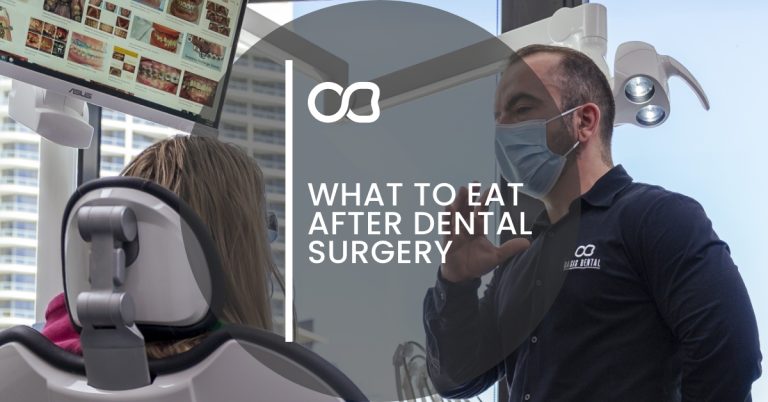Eating after dental implant surgery requires some careful planning, as what you put into your body in the days and weeks afterwards can affect your healing.
Since the mouth is still recovering and the implant site needs time to stabilise, food choices should support healing without creating unnecessary strain or irritation. It’s less about strict restrictions and more about making sensible adjustments that encourage recovery!
In this blog, we’ll look at what to eat after dental implant surgery, why certain foods are recommended, and how your diet can gradually expand as healing progresses.
What is the healing process like straight after dental implant surgery?
Straight after dental implant surgery, soft, cool foods are the generally most appropriate. At this stage, the gums and surrounding tissues are still quite sensitive, so avoiding anything that could irritate or disturb the surgical site is important.
Cold or room temperature foods like yoghurt or a smoothie can be suitable at this point. These types of foods are gentle on the healing tissue and don’t require biting or chewing. Drinking plenty of fluids is equally important, particularly water! Your dentist may also advise you to stay away from acidic or sweet beverages, such as concentrated fruit juices or highly sugary drinks.
What can change in terms of food and drinks in the first few days of recovery?
During the first few days, the implant site is still in its initial healing stage. Swelling, bruising, and some discomfort are all expected, which means food choices should remain soft, cool, and easy to swallow.
Soups can be helpful if eaten lukewarm, particularly smooth, blended varieties without chunks that might get caught near the implant. Mashed vegetables, porridge, or soft scrambled eggs are also options that provide nutrition without requiring strong chewing.
Protein is valuable at this stage as it helps support tissue repair. Since chewing meat can be too difficult, softer sources like eggs, cottage cheese, or protein-enriched shakes may be more suitable. Patients should still avoid crunchy, sticky, or spicy foods, as these can interfere with the healing process or cause unnecessary irritation.
How can I start to expand my diet again as healing progresses?
After the first week, most patients can begin to expand their diet, though care still needs to be taken to continue to support sufficient healing.
Foods that require only minimal chewing, such as pasta, soft rice, or tender fish, can often be introduced. The idea is to slowly transition from liquid and pureed foods to softer solids, without rushing into anything that might place pressure on the implant site.
During this stage, patients may still find chewing on the side of the mouth with the implant uncomfortable. It’s usually best to chew on the opposite side until healing has advanced further. Soft fruits like bananas or ripe avocados can be introduced, along with well-cooked vegetables that are soft enough to be mashed with a fork.
What foods and drinks should I avoid after dental implant surgery?
While it can be tempting to return to your regular diet quickly, certain foods should be avoided for longer to prevent any complications or setbacks in the healing process.
Hard, crunchy foods such as nuts, crisps, or crusty bread can place unnecessary strain on the implant site. Sticky foods like caramel or chewing gum can pull at the area and introduce bacteria. Spicy or acidic foods, including citrus or tomato-based dishes, may also cause irritation or discomfort in the early stages.
You should also avoid alcohol and smoking, as both can interfere with the healing process and increase the risk of complications. Hot drinks, particularly tea and coffee, may need to be limited initially, as heat can worsen swelling and irritation in the days straight after surgery.
Your dentist can give you more specific guidance on what to avoid after your procedure during your consultation.
When can I return to my normal diet?
By the time several weeks have passed, many patients will be able to return to a more regular diet. The timeline will depend on how quickly the implant site heals and how comfortable chewing becomes. While the early stages focus heavily on avoiding strain, over time it’s important that the jaw gradually regains normal function through regular eating.
Even as your diet expands, it’s still helpful to be mindful of very hard foods. Crunching on ice cubes or hard sweets, for example, can stress both implants and natural teeth. For most patients, though, eating habits can return to normal once their dentist has confirmed that healing is progressing well.
Every patient will recover at a slightly different pace, and food choices should reflect that. If chewing feels uncomfortable, sticking with softer options for longer is usually the best approach. Dentists will often provide personalised dietary guidance after surgery, taking into account the details of the procedure and the patient’s overall health. Following that advice should take priority over general recommendations, since it is tailored to your situation.
Comprehensive Dental Care at Oasis Dental Studio: General and Cosmetic Dentists in the Gold Coast, Brisbane, Melbourne and Pottsville
If you may need to undergo dental implant surgery, choosing a clinic that will approach your needs with care and detail will be a smart step.
The right clinic will inform you of the aftercare process and provide you with personalised guidance, including what to eat after your procedure, and how soon you can return to your regular diet.
At Oasis Dental Studio, our team of dentists approach procedures comprehensively, ensuring that your overall oral health is in good shape and that you know how to care for your teeth at home.
If you do need dental implants, we will discuss your needs, explain the procedure and provide you with helpful advice during a detailed consultation process.
If you’re concerned about your oral health or just want a general check-up, you are welcome to get in touch with our team! We have locations in the Gold Coast, Brisbane, Melbourne and Pottsville.

